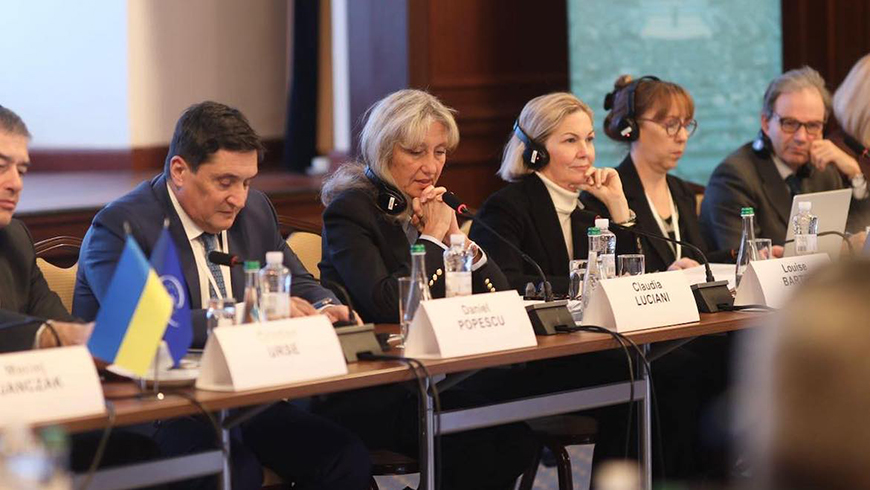The Council of Europe continues facilitating discussions among the stakeholders to advance good democratic governance reforms in Ukraine. The High-level Dialogue II “Good Democratic Governance in Ukraine: achievements, challenges and the way forward in post-war period” took place in Kyiv on 4 December 2023.
Following spirited discussions and debates moderated by the Council of Europe, key national stakeholders found a broad agreement as regards further actions to improve legal framework on multi-level governance and elections in line with the European standards, good practice and with the view of Ukraine’s EU candidate status.
Council of Europe’s Directorate General of Democracy and Human Dignity organised and facilitated the dialogue in co-operation with the secretariats of the Venice Commission, the Parliamentary Assembly and the Congress of local and regional authorities of the Council of Europe.
“The only path to successful reforms of good democratic governance in Ukraine is a combination of wisdom, openness and mutual understanding between all key stakeholders. We should focus on raising governance standards, improving the legislative framework in the field of multi-level governance and elections, and implementing careful administrative supervision over the activities of communities. This is our joint task and challenge on the way to Ukraine’s EU accession,” noted Mr Oleksandr Korniyenko, First Deputy Chairperson of the Parliament of Ukraine.
“Today’s meeting is yet again a very important step for the free, democratic, and peaceful future of Ukraine. The Council of Europe remains strongly committed to supporting the country for a sustainable recovery and transformation,” emphasised Mr Mathieu Mori, Secretary General of the Congress of Local and Regional Authorities of the Council of Europe.
The first part of the dialogue was devoted to finding consensus on criteria to assess feasibility of elections and referenda in Ukraine in the post-war period. Participants discussed the draft legislative provisions on elections and referenda and how to organise voting in specific territories. In that context, particular attention was paid to issues of defining the criteria and indicators to assess necessary pre-conditions for organisation of elections, as well as procedures for decision-making and dispute resolution.
“For post-war elections, a balance must be found between the need to ensure electoral rights and compliance with election standards. The optimal time must be chosen, and to determine it, clear criteria for the possibility/impossibility of holding elections are needed, and the main ones of these criteria should be safety and security. After all, as written in the Constitution of Ukraine, human life and health are the highest value,” emphasised Mr Oleh Didenko, Chairperson of the Central Election Commission.
“Ukraine faces many challenges in designing the conditions and criteria which will govern post-war elections. The Assembly stands ready to assist the country in this process and support the Ukrainian authorities in adjusting and strengthening the legislative framework and laying post-conflict foundations that meet the democratic and electoral standards of our Organisation,” said Ms Louise Barton, Director of the Human Dignity and Sustainable Development Directorate, Parliamentary Assembly of the Council of Europe.
During the second part of the dialogue, participants focused on taking stock of the next steps in advancing local self-government reform which is an integral part of the roadmap on good democratic governance in Ukraine. The parties discussed the draft law on the reform of local state administrations and introduction of the legality supervision over local authorities’ decisions (draft law No. 4298), key milestones and conditions for re-instating local self-government and transition from military administrations to regular (civilian) legal regime. Other issues on the agenda included division of competences between the state and local governments, preconditions for sustainability, and irreversibility of the decentralisation reform.
“Human rights, the rule of law and the development of sustainable democratic institutions represent foundation of a democratic society. The re-instating of public authorities, ensuring the electoral rights of citizens after the de-occupation of Ukrainian territories, is our key task. At the same time, it is necessary to ensure security and compliance with European governance standards,” commented Mr Oleksandr Kubrakov, Vice Prime Minister on Ukraine’s Recovery – Minister of Communities and Territories Development and Infrastructure of Ukraine.
“Working in close partnership with the Ukrainian counterparts on democratic reforms is the Council of Europe’s mission and a very rewarding experience for us. This reinforces our shared European community of values,” stressed Ms Claudia Luciani, Director of Human Dignity, Equality and Governance of the Council of Europe.
The activity was carried out within the framework and with the support of the Council of Europe projects on “Strengthening Good Democratic Governance and Resilience in Ukraine” and “Supporting democratic post-war elections in Ukraine” implemented under the Council of Europe Action Plan for Ukraine “Resilience, Recovery and Reconstruction” for 2023-2026.
The High-level Dialogue was launched in the Council of Europe in November 2022 following the initiative of the Parliament, Government and Central Election Commission of Ukraine. Its subsequent final document – Joint Declaration – was signed by Deputy Secretary General Bjorn BERGE and First Vice-Speaker of the Parliament Oleksandr KORNIYENKO.





